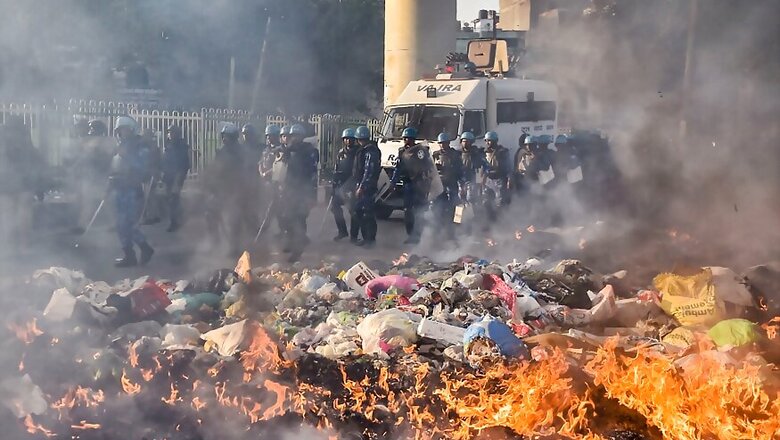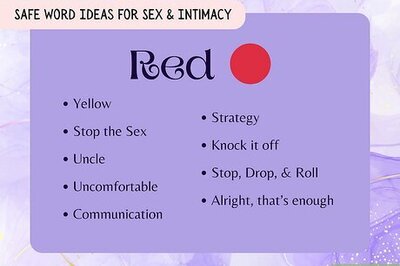
views
All three major political parties in Delhi have reasons to be embarrassed with regard to their inglorious conduct during and after the communal violence in the capital last week, particularly the fact that they were missing in action at its peak.
The Bharatiya Janata Party (BJP)'s dilemma is particularly grave. Being in power at the Centre with jurisdiction over law and order in Delhi, it must be seen to follow through on the mandate and has no valid excuse for its failure to do so. However, belated action against the rabble-rousers (like Kapil Mishra) within its ranks may alienate hardline supporters, who hold those protesting against the Citizenship Amendment Act (CAA) culpable for the violence.
The incompetent handling of the CAA imbroglio not only embarrassed the government, but created a cleavage within the Rashtriya Swayamsevak Sangh (RSS) and the BJP. The contradictory statements on the National Register of Citizens (NRC) emanating from the top leadership and the deployment of National Security Adviser Ajit Doval in Delhi were necessary optics: substituting an emollient narrative for a polarising one.
But behind the scenes, discomfort with the outcomes of the hardline approach is palpable and found expression in RSS no. 3 Dattatreya Hosabale's observation, post the riots, that 'maryada' (civility) of language in political life must be maintained. The statement is widely seen as an implied criticism of hate speeches.
With so much egg on its face, the BJP naturally hopes public memory will prove to be short. Its leaders, including the area MP, avoided the riot-hit parts, preferring to visit the victims in hospital. The field tours were left to Lieutenant Governor Anil Baijal and the NSA.
The BJP's big blunder in Delhi would ordinarily have offered the Opposition a club with which to beat the ruling party. If they have not used the opportunity, it is because their role has hardly been commendable.
The Aam Aadmi Party (AAP) convener and Chief Minister Arvind Kejriwal found himself under fire from former friends on the Left for having failed to make his presence felt in the riot-affected areas, until prompted to do so by the high court. When he finally did, after the violence had died down, he went to the fringes and did not point fingers at either the central government or the Delhi police.
He lost no time in sacking AAP councillor Tahir Hussain, booked in the brutal murder of Intelligence Bureau operative Ankit Sharma, whose body was found after the riots. He followed it up by green-lighting the prosecution of Communist Party of India leader Kanhaiya Kumar in a long-pending sedition case.
AAP has shed its activist avatar, because taking sides in a highly polarised scenario would be counterproductive. To attack the BJP at this stage would be to align itself with the anti-CAA protests, thereby annoying the majority community (an issue Kejriwal studiously avoided during the Delhi election campaign recently, with excellent results).
If the debate intensifies, 'Hanumanbhakt' Kejriwal may well find himself targeted by the likes of West Bengal chief minister Mamata Bannerjee who has dubbed the riots as a “planned genocide”. He would prefer to put the contretemps behind him and focus, instead, on winning the 2022 municipal elections.
The Congress response was so delayed as to render it virtually irrelevant. A peace march was held in Lutyens, Delhi and a delegation of senior leaders called on the President to demand home minister Amit Shah's resignation. But the party waited until its Member of Parliament Rahul Gandhi had returned from his foreign tour before visiting the affected areas – a full week after the riots.
Congress MP K Suresh then proceeded to further embarrass the party by declaring that the tour of north-east Delhi had been undertaken under "tremendous pressure", as leaders of other parties like the Indian Union Muslim League and CPI had already been there.
Rahul Gandhi confined his visit to a school that had been vandalised during the riots and made a statement which, for him, was quite nuanced: “Violence and hate are enemies of development."
The party's confusion is understandable: politicising the issue may wrest the minority vote from AAP and underline the government's failure; on the other hand, it may straitjacket the Congress into a framework that has proved electorally unproductive in the past.
The Congress has now decided to debate the Delhi violence in Parliament. This will serve to embarrass both the Treasury and the Opposition benches, given the ignoble behaviour of all parties concerned.
(The author is a senior journalist. Views are personal)
















Comments
0 comment